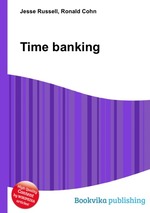Time banking
Jesse Russell Ronald Cohn
бумажная книга
High Quality Content by WIKIPEDIA articles! Time banking is a pattern of reciprocal service exchange that uses units of time as currency. It is an example of an alternative monetary system. A time bank, also known as a service exchange, is a community that practices time banking. The unit of currency, always valued at an hour`s worth of any person`s labor, used by these groups has various names, but is generally known as a time dollar in the U.S. and a time credit in the U.K. Time banking is primarily used to provide incentives and rewards for work such as mentoring children, caring for the elderly, being neighborly—work usually done on a volunteer basis—which a pure market system devalues. Essentially, the "time" one spends providing these types of community services earns "time" that one can spend to receive services. As well as gaining credits, participating individuals, particularly those more used to being recipients in other parts of their lives, can potentially gain confidence,social contact and skills through giving to others. Communities therefore use time banking as a tool to forge stronger intra-community connections, a process known as "building social capital." Time banking had its intellectual genesis in the U.S. in the early 1980s. By 1990, the Robert Wood Johnson Foundation had invested US $1.2 million to pilot time banking in the context of senior care. Today, 26 countries have active Time Banks. There are 250 Time Banks active in the U.K. and over 276 Time Banks in the U.S.


